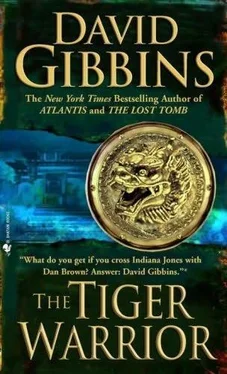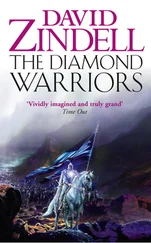David Gibbins - The Tiger warrior
Здесь есть возможность читать онлайн «David Gibbins - The Tiger warrior» весь текст электронной книги совершенно бесплатно (целиком полную версию без сокращений). В некоторых случаях можно слушать аудио, скачать через торрент в формате fb2 и присутствует краткое содержание. Жанр: Прочие приключения, на английском языке. Описание произведения, (предисловие) а так же отзывы посетителей доступны на портале библиотеки ЛибКат.
- Название:The Tiger warrior
- Автор:
- Жанр:
- Год:неизвестен
- ISBN:нет данных
- Рейтинг книги:4 / 5. Голосов: 1
-
Избранное:Добавить в избранное
- Отзывы:
-
Ваша оценка:
- 80
- 1
- 2
- 3
- 4
- 5
The Tiger warrior: краткое содержание, описание и аннотация
Предлагаем к чтению аннотацию, описание, краткое содержание или предисловие (зависит от того, что написал сам автор книги «The Tiger warrior»). Если вы не нашли необходимую информацию о книге — напишите в комментариях, мы постараемся отыскать её.
The Tiger warrior — читать онлайн бесплатно полную книгу (весь текст) целиком
Ниже представлен текст книги, разбитый по страницам. Система сохранения места последней прочитанной страницы, позволяет с удобством читать онлайн бесплатно книгу «The Tiger warrior», без необходимости каждый раз заново искать на чём Вы остановились. Поставьте закладку, и сможете в любой момент перейти на страницу, на которой закончили чтение.
Интервал:
Закладка:
A waft of breeze brought a hint of something exotic, heady even, some crop in the valley perhaps, but then the air was still, and all Jack could sense was the dusty smell of decay and dereliction, the familiar lifeblood of the archaeologist. He breathed it in, relishing it. He wished Maurice Hiebermeyer was with him now. He would have helped Jack to make sense of the walls, the jumble of ruins. Or perhaps it was too far gone to unravel, and there was nothing more to glean than what he could see in front of him.
Jack looked around. The place had a desolate beauty. They had passed ruinous houses, mud-brick walls bleached white by the sun, surrounded by patches of corn and barley that seemed doomed to lose the battle against the scorching sun. Rutted tracks led across stony fields, the scars of plowing and long-dry irrigation channels baked hard by the sun. In the distance the odd goat and sheep picked at the ground, finding something in the gravel and dust. The sky itself seemed scorched, colorless, and most of the time he could see nothing beyond the low plateau he stood upon, but then some upper wind would push apart the dust and the sky would streak with red. In those moments he saw the foothills of the Xaipan Mountains, great folds and spurs that rose up to a jagged skyline. To the north was another line of mountains, more distant, and between the two chains of mountains lay the Gansu Corridor, the eastern Silk Road. Here the pounding progress of the camel caravans had once stirred up a continuous storm of dust, a storm whose residue seemed to remain above the valley floor like the exhaust of history, a great exhalation from the past that was still unable to settle.
Jack realized that he had been to places like this before, on the edge of the Atlas Mountains in Morocco, in the north Syrian desert, in Andalusia in Spain. Places where ancient communities had once thrived on the periphery, but where exhaustion of the land and the spirit had overwhelmed all attempts to carve an existence out of the precious pockets of soil, so easily swept away by the whims of climate and erosion. He was told that it rained less and less here now, and the agriculture that had once sustained the village was being blown away in the wind. Soon, even the ancient walls would become part of the dust cloud that eddied and flowed along the Silk Road, caught between the endless chain of mountains that defined the corridor that had once linked the great empires of east and west.
Jack sat down on a stone revetment. Costas came up and sat beside him, wiping the dust from his face. He stared glumly at the wall. “This is when you know you’re in the presence of a real archaeologist,” he said. “One of the greatest wonders of history lies just over the horizon, the fabled tomb of the First Emperor, the terracotta army. But no, we come to sit in front of a crumbled wall in a wasteland in the choking dust and the burning heat. Hungry, thirsty, tired and needing a holiday very badly.”
Jack passed him his water bottle. “But I can never make sense of it without you. Archaeology, I mean. You keep my feet on the ground.”
“Right.” Costas swigged from the bottle, then passed it back. “So what’s the truth about this place, Jack? Is this what you brought us all the way to see?”
Jack passed Costas a piece of paper. “I printed this out from the helicopter’s computer this morning. I knew you’d need an antidote to a ruined wall. Headline news, CNN. Your elephant ship off Egypt. Remember? I think that stands up to the terracotta warriors, don’t you? And we found it.”
Costas peered at the photo and his eyes lit up. “Look, they got my new submersible in the picture, the ROV-6. I asked the IMU film team to get that into the publicity shots. You can even see the new strobe array. Perfect.”
“The elephants, Costas, the elephants.”
“Yeah, that too.” They stared for a moment at the extraordinary image they had first seen ten days before, the coral-encrusted shape of an elephant sitting on the bottom of the Red Sea. Costas read out the caption. “Egyptologist Dr. Maurice Hiebermeyer announces sensational shipwreck find.” He slapped the paper. “I don’t believe it. No mention of us anywhere. Just Hiebermeyer.”
“We’ve got to allow the dirt archaeologist a moment of glory,” Jack said. “After all, he was the one who got us out to Egypt in the first place.”
“This happened when we found Atlantis,” Costas grumbled. “I’d set up a special demonstration of the Advanced Deep Sea Anthropod. The press were all over Hiebermeyer and his wretched mummies.”
“That’s Egyptology for you.”
“Anyway, it should be you doing the interviews.”
“Maurice is better at it than me. He’s got all that bubbly energy. And he’s less threatening.”
“Threatening?” Costas peered at him. “Let me guess. You don’t want the world to know there’s a real Indiana Jones around, do you? It might put the bad guys on their guard. You like to keep a low profile.”
“Exactly.”
“You didn’t answer my question. The truth about this place.”
Jack gestured at the crumbling wall. “It’s what you see in front of you. A few years ago, Chinese archaeologists identified these walls as Han dynasty, contemporary with the Roman Empire. They thought this might be the site of Lijian, a settlement in the Gansu Corridor mentioned in Han records. Lijian might derive from a Han Chinese word for westerner, for those who lived beyond the Persians. Later this place might have been renamed Jielu, possibly meaning ‘captives from the storming of a town.’ It was common for the Han to settle their prisoners of war in places that were then named after their origin. The big leap of imagination was to connect this place with the theory that the Chinese employed Roman mercenaries, survivors of Crassus’ legions who had escaped from Persian imprisonment.”
“So that’s it,” Costas murmured. “That’s why we’re here.”
“It’s not clear-cut,” Jack said. “The story of Fabius and the others in the boat might have ended on Lake Issyk-Kul. But it might not. There’s another possibility. A really fascinating one.”
“Go on.”
“The Roman survivors of Carrhae were imprisoned in Merv in 53 BC. Licinius and Fabius and their comrades made their break about thirty years later. Over the years others must have tried to escape. Perhaps one group was successful, and word filtered back to Merv of the opportunities for mercenaries in the east, the great riches to be had. Perhaps that was what inspired Licinius and Fabius. And the hints about this place would seem to refer to an earlier group. The History of the Former Han Dynasty records soldiers fighting in 36 BC for a renegade Hun warlord, deploying in a formation reminiscent of the Roman testudo maneuver with interlocked shields above their heads. That’s the one shred of evidence on which the whole theory hangs. A few who had been persuaded by the argument began to identify Lijian with the Roman settlement. And here we are.”
“Any Roman artifacts?” Costas said, kicking the dust. They looked up as the two women joined them. Rebecca carried on, walking around the ruins in front of them, examining the walls. Costas shifted to make space for Katya on the wall.
Jack shook his head. “It’s like Katya said at the Roman burial beside Lake Issyk-Kul. You wouldn’t expect to find any. If Romans were here, they would have had nothing of their former life with them. It would have been stripped away from them on the battlefield, and then at Merv. But there’s one fascinating feature of this place. Not artifacts or ruins, but people. There’s a striking incidence of fair features, green eyes, flaxen hair, big noses. Some Chinese scholars who came here saw these features as western Asiatic, then someone remembered the Roman connection, and the idea caught on.”
Читать дальшеИнтервал:
Закладка:
Похожие книги на «The Tiger warrior»
Представляем Вашему вниманию похожие книги на «The Tiger warrior» списком для выбора. Мы отобрали схожую по названию и смыслу литературу в надежде предоставить читателям больше вариантов отыскать новые, интересные, ещё непрочитанные произведения.
Обсуждение, отзывы о книге «The Tiger warrior» и просто собственные мнения читателей. Оставьте ваши комментарии, напишите, что Вы думаете о произведении, его смысле или главных героях. Укажите что конкретно понравилось, а что нет, и почему Вы так считаете.












